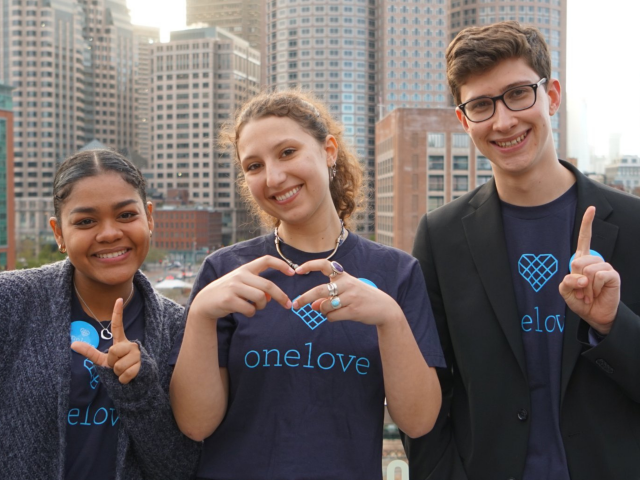Everyone deserves to have healthy relationships. But healthy relationships don’t just happen on their own—they’re built over time, with each participant actively shaping a dynamic that’s either healthy or unhealthy. What largely determines the quality of the relationship? The behaviors of each person.
Unfortunately, few of us are ever taught how to practice healthy behaviors in interpersonal relationships in the same way we’re openly taught how to drive a car or practice safe sex. This lack of knowledge leaves us vulnerable to getting caught in unhealthy relationships, something that can happen without us even consciously realizing it.
The good news is that healthy behaviors can be learned and practiced at any age, in any relationship, whether with a friend, partner, or family member. And you don’t have to completely overhaul your life in order to see improvements. Taking even the smallest step to empower yourself in a relationship can have a huge impact on creating a healthier dynamic. Here are four simple ways you can start practicing healthy behaviors in your relationships today.
1. Say “No” Unapologetically

Saying “no” to someone you care about isn’t easy, particularly if you tend to shy away from conflict and keep the peace by being overly agreeable. Driven by a need to seek approval and avoid confrontation, people-pleasers often go to uncomfortable lengths to uphold their good-girl or good-boy image and avoid unpleasant labels such as “rude” or “selfish.”
Unfortunately, consistently minimizing your own needs in favor of satisfying the needs of others has detrimental effects on your personal well-being and that of your relationships. You become a doormat for others to walk all over. Negative feelings of resentment, powerlessness, anger, and frustration bubble under the surface of relationships, unrecognized until they boil over. Over time, people-pleasing can also prime you as a target for more dangerous manipulation tactics if someone with harmful intent sees that he or she can twist your arm into getting what they want. In such instances, as your relationship proceeds, you’ll likely see “little” requests become demands with increasingly higher stakes.
In a healthy relationship, both parties should feel that their needs are recognized, valued, and addressed. It should never be one-sided, where one person always gives in, and you should never feel compelled to say “yes” when you really want to say “no,” especially when doing so conflicts with your needs or values.
So attention all people-pleasers out there: it’s okay to say “no.” Scratch that, it’s more than okay, it’s healthy to say “no.” Saying “no” doesn’t make you a bad person. What it means is that you respect yourself enough to honor your own needs, boundaries, and priorities. This display of self-respect is a powerful signal to others to treat you with the respect you know you deserve and is behavior that helps pave the way for healthy relationship dynamics.
How can you start saying “no”? First, give yourself time to process a request. Delaying the decision, whether for an hour or a week, with “I’ll get back to you” or “let me check” removes urgency from the situation where you might feel pressured to answer “yes” on the spot. It also gives you time to get in touch with your own needs as well as that sometimes elusive “gut” instinct, making sure you give fair consideration to what’s best for yourself.
If and when you’re ready to respond with a “no,” it’s helpful to rehearse a few go-to statements beforehand in case you get nervous or tongue-tied; for example, “Unfortunately, that doesn’t work for me” or, “I’ve given it a lot of thought, and I’m not going to be able to,” or simply, “No, I’m unavailable.”
While you could offer a reason why you’re declining, know that you absolutely do NOT have to. A simple “no” is sufficient, so try to resist the temptation to over-explain or tack on “I’m sorry” to the beginning or end of your response. It’s a force of habit for many of us but really, why should you apologize for taking care of your own needs? Hint: You shouldn’t!
2. Make a Decision and Own It

Being overly agreeable with decision-making, specifically leaving other people to make decisions for you, can also set the stage for unhealthy relationships to flourish. Just as giving in to little favors may seem harmless, delegating minor decisions like deciding which movie to watch may also seem inconsequential. You might think, “It doesn’t really matter to me so I’ll just let someone else decide.”
The challenge occurs when you start to habitually delegate decisions, setting precedence and opening the door for potential manipulation and abuse. For example, let’s say you always end up letting your friend pick the movie for your weekly movie night. Eventually, she stops asking you and makes the decision on her own. Then one day her boyfriend shows up to your movie night and she explains that she thought it wouldn’t be a big deal since you’re so chill—you don’t even care which movie you watch. And even though you’re annoyed he’s crashing your BFF time, you let it slide because you are so easygoing. Aren’t you?
Here, your friend used your behavior in one area (picking a movie) and extrapolated it to another situation (who could join in on your movie night) and assumed that you’d react the same way (letting her decide without the opportunity to weigh in). Even in this fairly innocent example, it’s clear how consistently giving another person control over decisions has the potential to set unhealthy expectations and create pressure to respond in the same way even when the circumstances are different.
In healthy relationships, one person shouldn’t make all the decisions; even if it’s been that way in the past, you always have the ability and the right to change it. Some healthy challenging may occur, particularly if you’re stepping out of a very passive role and becoming newly assertive. For example, if you choose the movie this week, your friend might express healthy disappointment like, “Aww, I already psyched myself up about that other movie. It’s disappointing that we’re not going to watch it.”
However, watch out for any resistance in the form of blaming, guilt-tripping, or punishment, which are signs of an unhealthy relationship. For example, “I put so much time into planning this night and now you completely ruined it,” or, “I don’t want to even go anymore. I’m just going to hang out with my other friend instead.” You should never be made to feel bad for asserting your opinion in a healthy way.
The more insignificant decisions may be easier to hand off to someone else, but those decisions are actually great opportunities to practice being more assertive because the stakes are so low. A supportive friend, partner, or family member will listen to and respect your opinion.
So the next time a small decision comes up, don’t pass it off—make the decision. Even if it doesn’t turn out great—for example, the movie you choose is a bust—you’ll begin to develop a new sense of empowerment that you can carry over to bigger and more important decisions when they arise.
3. Speak Up When Something Upsets You

In relationships, don’t let the “small” stuff slide when it upsets you. Doing so poses the same potential danger as deferring small decisions to someone else—it’s a slippery slope that can move undetected into unhealthy territory when not speaking up becomes a habit that another person can take advantage of.
A big reason people don’t speak up when the small stuff upsets them is because, well, it’s small, and they question their right to be upset at a situation that seems trivial.
If, after someone you have a relationship with does something that makes you feel bad and you find yourself trying to explain away your emotional response with a statement along the lines of, “I know I shouldn’t be angry/annoyed/hurt/jealous [fill in the emotion]…” STOP. RIGHT. THERE.
You have the right to feel whatever feelings come up—this is something that’s beyond your or anyone else’s control. There is no one-emotional-response-fits-all when it comes to dealing with a given situation. Whatever negative emotion you feel is valid and a signal to you that you need something that you’re not getting.
When these negative emotions arise in a relationship, it’s an opportunity to discuss needs and boundaries with the other person. Try broaching the subject in a non-blaming way so the other person doesn’t feel attacked or get defensive. For example, “I felt [insert negative emotion] when you [insert their action that the caused emotion].” Regularly addressing the small stuff helps to promote a practice of openness and communication within a relationship and can give you the confidence and framework to address bigger issues in the future.
4. Laugh at Your Imperfections

Everyone makes mistakes, has insecurities, or some flaw they wish they could magically make disappear. It’s part of being human. And anyone who wants to manipulate us—whether in the shape of a partner, friend, or family member—will sniff out our greatest fears and weaknesses and try to use them against us.
While your initial thought might be to hide your imperfections from the world, the best thing you can do is own them proudly (nothing like owning that imperfection, right?). Openly making light of your flaws makes them less significant and takes away powerful ammunition from anyone who tries to use them to hurt, manipulate, or control you.
Laughing at your own imperfections also communicates to others that you accept yourself as you are and you expect them to do the same. It’s like saying, “Here I am, take it or leave it!” Vulnerability is scary, but a healthy partner, friend, or family member will accept and love you, flaws and all.
All relationships, even ones that are already healthy, require active work to get and stay that way. The beauty of these four behaviors is that you can incorporate them into your existing relationships immediately. But don’t be fooled by their simplicity—changing one’s behavior is incredibly difficult and you’ll likely find even the smallest step challenging. Know that lasting change won’t happen overnight, so be kind to yourself as you learn and take time to celebrate your small wins along the way. With practice, you’ll become more empowered and better equipped to lead healthy relationships with others.[/vc_column_text][/vc_column][/vc_row]
Browse by Category

How to Have Healthy Holiday Conversations with Family (and Prep Your Partner)
The holidays are a time for family, good food, and—let's be real—sometimes intense conversations. Whether it's politics, lifestyle choices, or…
3.2 Million Strong: How One Love is Saving Lives Through Education
Please share this blog with your network across social media,…
Finding Strength in Our Stories: Domestic Violence Awareness Month
⚠️ Trigger Warning: This blog includes content and language related…
How to End a Summer Romance or Friendship
Summer flings and friendships can feel fleeting. So why is…
Celebrate Your Freedom: Independence in Relationships
As Independence Day rolls around, let’s chat about something just…














